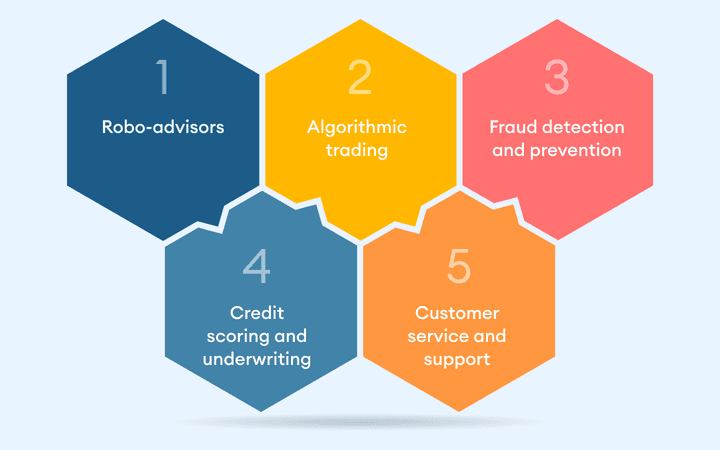Artificial intelligence (AI) and machine learning (ML) are rapidly emerging technologies that have the potential to revolutionize the financial services industry.

At its core, Artificial Intelligence (AI) refers to the development of computer systems that can perform tasks that typically require human intelligence, such as visual perception, speech recognition, decision-making, and language understanding.
Whereas, Machine Learning (ML), is a subset of AI that involves the use of algorithms and statistical models to enable systems to learn and improve from data, without being explicitly programmed.
The use of AI and ML in financial services is not a new concept, with early adopters experimenting with these technologies as early as the 1950s. However, recent advancements in computing power, data storage, and algorithms have made it possible to apply AI and ML at a larger scale, leading to an increasing number of financial institutions exploring the potential benefits of these technologies.
In the financial services industry, AI and ML are being used to improve operational efficiency, automate repetitive tasks, and enable more personalized and customized financial products and services. It is also used in a digital fintech software solution, in some cases.
According to a report on the State of AI in Financial Services, it was found that 91 percent of financial services companies were driving profitable outcomes with investments in AI in their solutions. This shows that AI in financial services has started to prove itself by leaving a positive impact on the financial industry.
Moreover, according to a study by Cambridge Spark, ML, and AI skills have been potentially valued at around $ 1 trillion in the financial services sector like banking and related services.
In this blog post, we will explore the benefits, applications, challenges, and future outlook of AI and ML in the financial services industry.
Through a deep dive into the current state of these technologies in the industry, we aim to provide a comprehensive understanding of the implications and opportunities that AI and ML present for the financial services sector.
Benefits of AI and ML in financial services
The use of AI and ML in financial services has the potential to bring significant benefits to the industry, including
Increased efficiency and automation
The implementation of Artificial Intelligence (AI) and Machine Learning (ML) in financial services has provided various benefits, one of which is the ability to automate monotonous and time-consuming tasks.
An instance of such an advantage is the application of Robo-advisors, utilizing refined AI and ML algorithms to facilitate automated investment counsel, subsequently decreasing the necessity for human financial advisors.
In addition, the utilization of AI and ML can also automate the complex process of credit scoring and underwriting, ultimately leading to a reduction in the time and resources required to authorize loans.
Improved risk management
AI and ML can improve risk management in the financial industry. By analyzing large amounts of data, AI and ML algorithms can identify patterns and trends that may indicate potential risks, allowing financial institutions to proactively manage and mitigate those risks.
Personalization and customization
AI and ML deliver more personalized and customized financial products and services to customers. For example, by analyzing customer data, AI and ML algorithms can recommend financial products and services that are tailored to an individual's financial goals and needs.
Enhanced fraud detection and prevention
AI and ML can enhance fraud detection and prevention in the financial services industry. By analyzing large amounts of data, AI and ML algorithms can identify patterns and anomalies that may indicate fraudulent activity, allowing financial institutions to proactively detect and prevent fraud.
These benefits can lead to cost savings for financial institutions and improved financial products and services for customers.
Applications of AI and ML in financial services
The use of AI and ML in financial services is becoming increasingly widespread, with a variety of applications being developed and implemented in the industry. Some of the most notable applications include:

Robo-advisors
Robo-advisors use AI and ML algorithms to provide automated investment advice to customers. These platforms use sophisticated algorithms to analyze data and make investment recommendations, allowing customers to manage their portfolios with minimal human interaction.
Algorithmic trading
AI and ML are also used in algorithmic trading, which refers to the use of computer programs to execute trades on financial markets. Algorithmic trading can help to improve the speed and efficiency of trades, and can also be used to identify patterns and anomalies in market data that may indicate potential trading opportunities.
Fraud detection and prevention
Financial institutions use AI and ML to detect and prevent fraud. By analyzing large amounts of data, AI and ML algorithms can identify patterns and anomalies that may indicate fraudulent activity, allowing financial institutions to proactively detect and prevent fraud.
Credit scoring and underwriting
AI and ML can automate the process of credit scoring and underwriting. By analyzing large amounts of data, AI and ML algorithms can identify patterns and trends that may indicate a customer's creditworthiness, allowing financial institutions to approve loans more quickly and efficiently.
Customer service and support
AI and ML contribute to enhancing customer service and support in the financial services industry. For example, chatbots and virtual assistants can use AI and ML algorithms to understand and respond to customer inquiries, reducing the need for human customer service representatives.
Process Automation
Process automation with AI and ML is a powerful tool that is being increasingly adopted by financial services organizations to improve their operational efficiency and customer experience.
One use case of process automation with AI and ML in financial services is in the area of loan processing. Traditionally, loan processing has been a time-consuming and manual process that involves a lot of paperwork and manual checks.
With AI and ML, loan processing can be automated, making it faster and more accurate. This can lead to significant cost savings for the financial services organization, as well as a better customer experience for borrowers who can get their loans approved quickly and easily.
In addition, AI and ML can be used to automate other processes such as fraud detection, customer service, and risk management, allowing financial services organizations to focus on higher-value activities that require human expertise.
Customer Retention
In the competitive landscape of financial services, retaining customers is crucial for maintaining profitability and sustainability. AI and ML have proven to be effective tools in improving customer retention in the financial services industry.
One use case of AI and ML for customer retention is through personalized marketing. By leveraging customer data, including their transaction history, behavior patterns, and preferences, financial institutions can create targeted marketing campaigns that are more likely to resonate with each customer.
Machine learning algorithms can analyze this data to identify patterns and predict future behavior, enabling institutions to offer tailored products and services that meet their customers' specific needs.
In addition, With the rise of digital transactions, fraud has become a significant concern for financial institutions. By utilizing AI and ML algorithms, institutions can detect and prevent fraud in real time, reducing the risk of financial losses and protecting their customers' assets.
These algorithms can analyze vast amounts of data, including transaction history, account activity, and behavior patterns, to identify suspicious activity and flag potential fraud attempts.
Moreover, AI and ML can also be used to enhance customer experience and improve customer satisfaction, ultimately leading to increased customer loyalty and retention.
Chatbots and virtual assistants powered by natural language processing can provide customers with personalized and efficient support, allowing them to quickly resolve issues and complete transactions. Sentiment analysis can also be used to gauge customer satisfaction and identify areas for improvement.
These are some of the most common applications of ML and AI in financial services, and it is expected that more use cases will emerge as the technology continues to evolve. As the use of AI and ML becomes more widespread in the industry, it will be crucial for financial institutions to stay informed about the latest developments and explore how these technologies can be used to improve their operations and services.
Challenges and ethical concerns
As with any emerging technology, there are challenges and ethical concerns associated with the use of AI and ML in financial services. Some of the key challenges and ethical concerns include:
Data privacy and security
Securing your customer’s online payment system or other financial services is very crucial. But, the use of AI in finance or machine learning requires large amounts of data to train and improve the algorithms. However, this data must be collected, stored, and used in a manner that respects customer privacy and protects against data breaches.
Read More: Secure your online payment system for your customers
Job displacement
The automation of tasks through the use of AI and ML technologies has the potential to displace jobs in the financial services industry. This can have a significant impact on employees and the broader economy, and it will be important to manage this transition in a way that minimizes the negative effects of job displacement.
Bias and fairness in decision-making
AI and ML algorithms are only as good as the data they are trained on, and if the data is biased, the algorithms will be as well. This can lead to unfair decisions, particularly in areas such as credit scoring and underwriting, which can have a significant impact on customers.
Transparency and explainability
AI and ML can be complex and difficult to understand at times, making it challenging for customers and regulators to understand how decisions are being made. This can make it even more important to ensure fairness and transparency in decision-making, and can also make it difficult to identify and address any biases that may be present in the algorithms.
And, it is essential for the financial services industry to address these challenges and ethical concerns, as the industry is heavily regulated and the potential impact of these technologies on customers and the broader economy is significant.
Future outlook
The usage of artificial intelligence and machine learning in financial services is currently in a state of rapid change and the dynamics of these technologies are expected to accelerate further soon. Several prominent developments and innovations to consider, include:
Advancements in AI and ML
Advancements are continuing apace in the domains of AI and ML, particularly in the realms of natural language processing, computer vision, and deep learning.
Such breakthroughs have the potential to inject even greater power and flexibility into AI and ML algorithms, thereby unleashing new applications and use cases that will inevitably disrupt and transform the financial services industry.
For example companies like Google (Google Assistant), IBM (Watson), Amazon (Alexa), and Microsoft (Azure) have been working consistently towards advancements in AI & ML.
Impact on the financial services industry
As AI and ML technologies continue to evolve, they are expected to have a significant impact on the financial services industry. This could include increased automation and efficiency, improved risk management, and more personalized and customized financial products and services.
For example, JPMorgan Chase has been using AI and ML in several ways to improve their digital fintech solutions and services. They have developed a virtual assistant, known as COiN, which uses natural language processing to help lawyers review and analyze legal documents. They also use AI and ML to monitor and analyze financial transactions to detect fraud.
language processing to help lawyers review and analyze legal documents. They also use AI and ML to monitor and analyze financial transactions to detect fraud.
Regulatory and legal considerations
As the use of artificial intelligence and machine learning in finance becomes more widespread, there will be a need for regulatory and legal frameworks that address the challenges and ethical concerns associated with these technologies.
This could include guidelines and best practices for data privacy and security, job displacement, bias and fairness in decision-making, and transparency and explainability.
Hence, the future of AI and ML in financial services is likely to be shaped by the ability of financial institutions to navigate and adapt to these changes. Those who can leverage AI and ML effectively will be well-positioned to gain a competitive advantage and offer more efficient, effective, and personalized services to their customers.
Conclusion
Within the ever-changing domain of financial services, the implementation of cutting-edge technologies such as artificial intelligence (AI) and machine learning (ML) has the potential to yield substantial benefits for the industry at large.
These benefits include an enhanced level of efficiency and automation, refined risk management, customized and personalized financial products and services, and exceptional fraud detection and prevention capabilities.
As we bear witness to an era of continuous technological advancement, the financial services industry has shown an ever-growing tendency to embrace the potential of AI and ML. It is expected that this trend will persist and potentially even accelerate in the future.
As an advanced digital payment solution provider, DigiPay.Guru, understands the importance of AI and ML in the financial services industry. We strive to provide our customers with innovative and secure solutions that leverage these technologies and are dedicated to staying at the forefront of this rapidly evolving industry.




